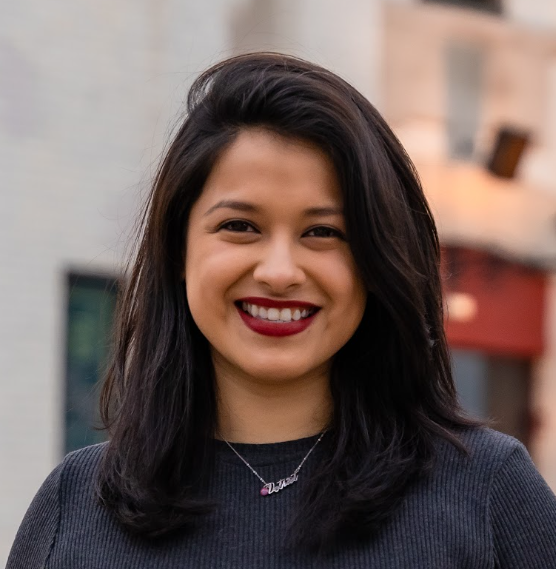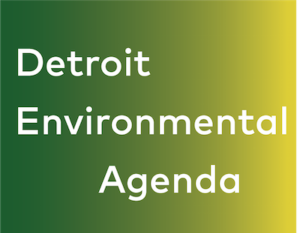Gabriela Santiago-Romero

Q: Where can people go to learn more about your biography? If not readily available online, please describe in 150 words or less, your relevant experience, public offices held (if any), involvement in environmental causes, and membership in any environmental organizations. If you currently hold office, describe any votes or actions demonstrating concern for the environment.
A: http://gabrielasantiagoromero.com/about-3
Community
Q: If elected, how will you work with Detroit residents to ensure that they benefit from and partake in the decision-making surrounding local development projects and that potential adverse impacts of those projects are identified, measured, monitored and mitigated? Moreover, how would you work to put more power into the hands of residents to maintain and revitalize their own communities and to access vacant land through the DLBA?
A: I will provide strong leadership and drive forward advancements through mutual partnerships, community agreements and fund development to sustain prosperity for the people who call Detroit home. Additionally, I promise to run a transparent office that has an open line of communication with local leaders and the public at large. I’m a community organizer and value relationships. As I campaign I’m working together with unions, community leaders and progessive elected officials to begin to get a sense of what are the issues and solutions people want. I will continue to organize with our people and hear from you what the issues are to get to our needed solutions. I’m knocking on doors and I’m hearing the Detroit Land Bank is a huge obstacle to navigate. Evaluating our Land Bank processes to provide needed changes is one of the first things I want to dive into while on city council.
Q: If elected, what budget appropriations would you propose to increase investment in needed social and environmental services to help improve the quality of life and health of Detroit residents?
A: I will support appropriations that support our need for clean air, clean water, affordable housing, and safe neighborhoods for families to grow and thrive. I will suggest that we take money from our already inflated police budget to allocate funding for needed social and environmental services. I’m also going to advocate for some of our ARP funding to be put towards long term solutions towards climate change and affordable housing.
Public Health
Q: What long term solutions do you see for addressing vehicle speeds and making our streets safer?
A: Detroit neighborhoods need a combination of more traffic lights, stop signs and speed bumps on side streets where accidents frequent. The lights and the signs will help manage traffic while the speedbumps will also help prevent danger in major ways. While on doors stop signs and street lights are common requests from residents who have seen a number of accidents over the years.
Q: How will you work to reduce the negative health impacts of air quality on the residents of Detroit?
A: I would support investing in our environment and holding corporations accountable who may be polluting our air and water. I support environmentally sustainable solutions for trucks and equipment that these companies use on a daily basis throughout our neighborhoods. I’m in support of our Detroit Water Ordinance and believe we should have one to protect our air quality.
Q: If elected, what actions will you take to work toward safer, healthier, and more affordable housing for all Detroiters?
A: I would support ensuring that residents have access to affordable housing, and housing grants that allow them to stay in their homes. As a community organizer I currently work with Detroit People’s Platform, Detroit Action, United Community Housing Coalition, Senator Chang and more to address our housing crisis in Detroit. I will continue my partnership with these organizations and leaders as I work on local policy and budgeting solutions that promote safe, accessible and affordable housing.
Energy
Q: What are your priorities to reduce emissions and lessen the impacts of climate change in Detroit during your term in office?
A: My priorities are to create measures of accountability for local corporations. We need water, air and land ordinances that protect our environment and our residents. I will work together with local organizations to set up systems and processes of accountability that we need.
Q: What are your plans for helping the city transition to renewable energy and how will you ensure that the cost benefits and increased resilience that come from the use of renewables is made accessible to low-income and vulnerable communities across Detroit?
A: I plan to advocate for creative solutions to invest in long-term energy solutions for our communities. I want us to provide solar panel grants for homeowners or block clubs that can create their own renewable energy. I’m willing to fight through whatever obstacles this may bring knowing we have big corporations that may fight back on these sustainable solutions.
Recycling
Q: How can the city increase recycling, composting, and the use of post-consumer recycled materials, while addressing the city’s litter and illegal dumping problem?
A: There should be no fees for recycling and all residents should have easy access to recycling programs and education in their neighborhood. I support my office providing public education on how to recycle and how to access recycling bins. I would support partnering with different organizations to amplify our message and outreach.
Jobs
Q: What steps would you take to prepare the local workforce to take advantage of and be part of the movement toward a green economy, through qualifying for good paying infrastructure and clean energy jobs, amongst others?
A: I plan on continuing to connect and invest in job training and workplace development programs. The city should continue to communicate and partner with educational institutions to make sure the proper courses are being offered to train a skilled workforce. I know that engaging our EJ leaders and business partners with these educational and training efforts will be crucial. I’m seeking the endorsements of local unions and hope to talk to them about seeking green infrastructure projects and advocating for a transition from fossil fuel industries to renewable energy.
Water
Q: How will you ensure that clean water is accessible and affordable to all Detroiters?
A: I will support the city charter that makes it so no Detroiter is allowed their water to be shut off. I support the charter’s policy on Detroiters spending no more than 3% on their water bill. I will support enforcement of codes and update current policies to maintain access to clean, affordable and accessible water.
Q: How will you help municipal agencies and property owners integrate Green Stormwater Infrastructure (GSI) across the city to manage stormwater and reduce drainage charge fees for property owners?
A: I will support the Green Stormwater Infrastructure efforts by outreaching and educating residents about the benefits of adopting these efforts into their lives. I will advocate for the city to allocate funds to grants that waive the fees to property owners.
Optional
Q: Please identify the top environmental concerns to you personally, identify the environmental issue in your community that is the most pressing, and what you would like to do as an elected official to address this most pressing concern.
A: There are a lot of issues and creative solutions I want to dive into. One issue we’re addressing in 48217 is the pollution from Marathon Refinery. We need to add green vegetation walls or trees that can help mitigate the pollution and help the ugly site residents have to see living next to a refinery. Around Clark Park residents are dealing with increased truck traffic and noise pollution because of it. Trucks are dangerous and ruin our roads. I will advocate for different routes that don’t cut into our neighborhoods and for more accountability from our trucking companies. Lastly, sustainability and green tech – I would invest in green tech and environmental improvements to support healthy neighborhoods and create union jobs through clean energy projects. An example of these services could be adding more streetlights and alleviating light pollution.

